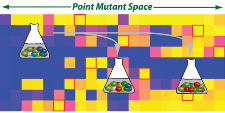The Lab

Investigating protein sequence-function relationships
The advent of high throughput methods to sequence DNA has flooded the scientific world with data. We now know the genome sequence of thousands of species and we can rapidly determine the mutations that exist among individuals within as species. This information includes a historical record of the critical events in evolution that have shaped differences between species as well as the genetic health of individuals and the drive towards individual medical treatments. However, it is a tremendous challenge to accurately interpret evolutionary mechanism and health predictions for individuals from sequence data because for every mutation that impacts health and fitness there are thousands of nearly neutral mutations with little to no impact on function.
To effectively make use of sequence information we need to learn how to convert it into functional information. We want to know:
- Which sequence changes can lead to drug resistance in rapidly evolving diseases including SARS-CoV2, HIV and cancer?
- What are the evolutionary mechanisms that connect changes in protein function with changes in cellular or organismal fitness?
- How do sequence changes to proteins that play critical roles in cellular physiology, including the Hsp90 chaperone and GTPase switches, affect protein function and impact cellular fitness?
Research Focus

Development of innovative technology to study sequence-function relationships
To address the critical knowledge gap between sequence and function, we pioneered the first technology using deep sequencing to systematically determine how every point mutation in a protein impacts its function. The EMPIRIC (Exceedingly Meticulous and Parallel Investigation of Randomized Individual Codons) and other related deep mutational scanning approaches provide rich datasets to improve sequence-function predictions and valuable empirical health and fitness information for critical genes. We utilize EMPIRIC sequence-function maps to investigate the structural and biophysical underpinnings of protein function as well as mechanisms that occurred during evolution over the past billion years and the rapid evolution of drug resistance that is a current threat to our health. The key technological advance that drives the EMPIRIC approach is the rapid generation of systematic libraries of specific mutations and the rapid assessment of the abundance of thousands of variants using deep sequencing. We continue to develop enabling and innovative technology to investigate critical questions in protein function and evolution.
Publications

Follow our research, stay in touch – join the lab!
Twitter Feed
Contact Us
Office:
Lazare Research Building 922
Campus Map (pdf)
Phone:
508-856-3588 (office)
Email:
Daniel.Bolon@umassmed.edu
Mailing Address:
UMass Chan Medical School
Attn: Dr. Daniel Bolon/BMB Department
364 Plantation St LRB922
Worcester, MA 01605
Join Us
We are always interested in applications from qualified candidates at postdoctoral and research associate levels.
Read more here
Undergraduates interested in pursuing a PhD at UMass Chan Medical School should apply directly to the Morningside Graduate School of Biomedical Sciences Program.



